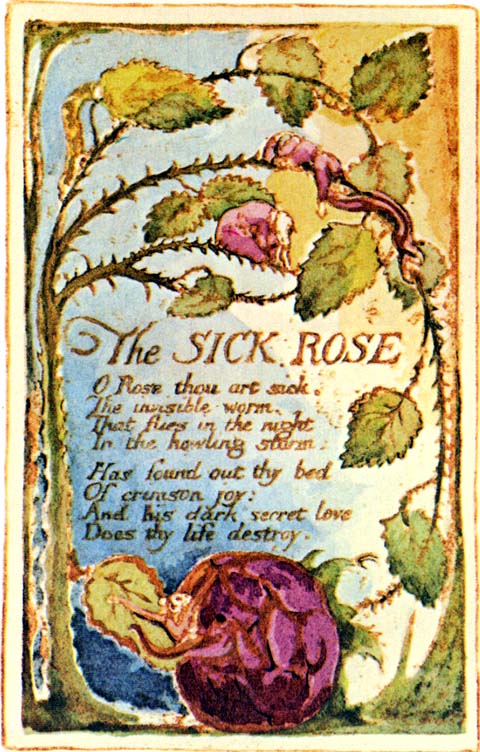O Rose, thou art sick!
Like in many of Blake’s poems, an exclamation mark is used where he comments on an issue that seems obviously atrocious to him, but the rest of the world is seemingly oblivious to it as they do nothing to
change it. “Rose” – could symbolize the natural world. Could symbolize virginity and purity, as corrupted by a new societal norm of chaos and promiscuity that came with industrialization. Could also refer to love, in that the sanctity of love and marriage have been corrupted: roses given as a token of love.
‘sick’ = the decay and death of the natural world, the death of traditional and Romantic notions regarding love and virginity.
‘Rose’ – connotations of beauty, could suggest the death of beautiful notions.
The Rose, as an inanimate object, cannot realize that it is sick so can do nothing to prevent its death.
The invisible worm
‘invisible worm’ – the seamless decay of the natural world in the name of industrialization, the seamless decay of romantic notions of relationships and love.
‘worm’ – creates a phallic image, the extended lexical field of sex and allusions to the loss of virginity; perhaps Blake is commenting on the loss of purity that has come with the loss of the natural world and of the ‘simpler life’ advocated by Romantics.
‘worm’ – also could be a religious allusion to the snake (devil) in the Garden of Eden; lust is tempting people to corrupt the beautiful elements of life, such as love and nature; further corruption to the point where virginity is no longer valued, purity is lost.
‘worm’ – shows connotations of decay, as furthered with the noun ‘flies’ in the next line; decay of natural world/romantic notions.
That flies in the night,
‘flies’ – the speed with which the degradation of the pure elements of life has occurred, seemingly impossible to stop in its path: it has occurred with the rapidity of industrialization.
‘night’ – a sordid and sexual time when prostitutes tend to work (ladies of the night); vulnerable ‘rose’ is more susceptible to corruption; flowers cannot flourish in the dark and their growth is therefore stunted.
In the howling storm
‘howling storm’ – industrialized world, allude to noisy machinery. Could also allude to the unstoppable power and strength of nature.
Has found out thy bed
bed’ – flowerbed; ‘found’ in order to corrupt and destroy the natural world.
– Literal bed, virginity is no longer seen as a pure and virtuous thing to possess, corrupted young girls (“youthful Harlots” in ‘London’)
(bed) Of crimson joy
‘crimson’ – the colour of a traditional rose
- Allusion to blood when the hymen is broken in when virginity is lost, the girl’s ‘purity is taken’.
‘joy’ suggests that the girl has willingly succumbed to her sinful desire, Blake comments on the loss of the sanctity of marriage and of loving relationships.
And his dark secret love
‘dark’ – adjective implies sin.
The corrupt and sinister side of people’s lives; ‘lust’ is one the 7 deadly sins; corrupted notions of love which only amount to sexual attraction.
Does thy life destroy.
‘thy life destroy’ –
‘destroy.’ – poignant verb to end the poem, end-stopped for dramatic effect.

